Toda Peace Institute's Lastest Publications
Complimentary copies of our publications are available where noted. Books which we no longer have in stock may be purchased directly from the publisher and will be indicated by a link.
Research Themes
- Climate Change and Conflict
- Arms Control and Disarmament
- Nonviolence and Peacebuilding
- Human Security and Global Governance
- Mediation, Conflict Resolution and Reconciliation
- Religion and Peacebuilding
- Music, Arts, and Peace
Climate Change and Conflict
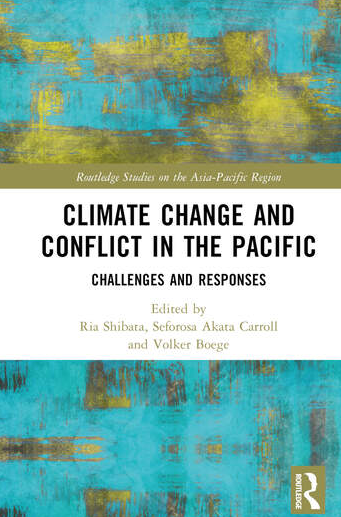 Climate Change and Conflict in the Pacific: Challenges and Responses, edited by Ria Shibata, Seforosa Carroll and Volker Boege, Routledge 2023. ISBN: 9780367431853 (hardcover).
Climate Change and Conflict in the Pacific: Challenges and Responses, edited by Ria Shibata, Seforosa Carroll and Volker Boege, Routledge 2023. ISBN: 9780367431853 (hardcover).
This book address the various dimensions of the climate change–conflict nexus and shed light on the overwhelming challenges of climate change in the Pacific Islands region.
It highlights the multidimensionality of the problems: political, technical, material, and emotional and psychological. Written by experts in the field, the chapters highlight the centrality and importance of opening up a dialogue between researchers involved in the large-scale global modelling of climate change and the local actors. Both scholars and civil society actors come together in sharing about the complexities of local contexts and the conflict-driving potential of climate change adaptation and mitigation strategies on the ground. The book brings together indigenous Pacific approaches with broader international debates in the climate change–security discourse. Through various accounts and perspectives, current gaps in knowledge are bridged, contributing to the development of more grounded, conflict-sensitive climate change policies, strategies, governance and adaptation measures in the Pacific region.
An important resource for students, researchers, policymakers and civil society actors interested in the multi-faceted issues of climate change in the Pacific.
Click here for more information on detailed chapter content.
Arms Control and Disarmament
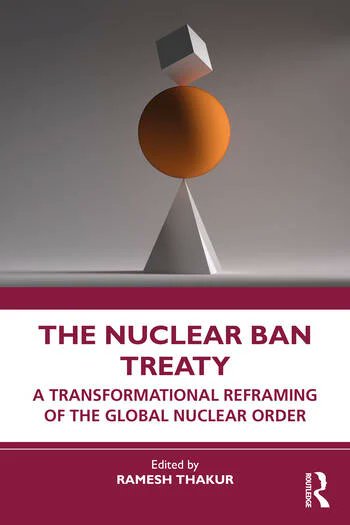 The Nuclear Ban Treaty: A Transformational Reframing of the Global Nuclear Order, edited by Ramesh Thakur, Routledge 2021, ISBN: 9781032130712 (hardcover), 9781032130705 (softcover), 9781003227502 (eBook).
The Nuclear Ban Treaty: A Transformational Reframing of the Global Nuclear Order, edited by Ramesh Thakur, Routledge 2021, ISBN: 9781032130712 (hardcover), 9781032130705 (softcover), 9781003227502 (eBook).
The contributors to this book describe, discuss, and evaluate the normative reframing brought about by the Treaty on the Prohibition of Nuclear Weapons (the Ban Treaty), taking you on a journey through its genesis and negotiation history to the shape of the emerging global nuclear order.
Adopted by the United Nations on 7 July 2017, the Ban Treaty came into effect on 22 January 2021. For advocates and supporters, weapons that were always immoral are now also illegal. To critics, it represents a profound threat to the stability of the existing global nuclear order with the Nuclear Non-proliferation Treaty as the normative anchor. As the most significant leap in nuclear disarmament in fifty years and a rare case study of successful state-civil society partnership in multilateral diplomacy, the Ban Treaty challenges the established order. The book’s contributors are leading experts on the Ban Treaty, including senior scholars, policymakers and civil society activists.
A vital guide to the Ban Treaty for students of nuclear disarmament, arms control and diplomacy as well as for policymakers in those fields.
Click here for more information on detailed chapter content.
 The European Security System Revisited: Studia Diplomatica No 1, Volume LXV-1 2012, edited by Sverre Lodgaard, 2012. ISSN: 0770-2965.
The European Security System Revisited: Studia Diplomatica No 1, Volume LXV-1 2012, edited by Sverre Lodgaard, 2012. ISSN: 0770-2965.
Articles:
The European Security System Revisited: EU-Russia relations, Margriet Drent
The European Security System as seen from Moscow, Dmitry Danilov
German-Russian relations. A Pan-European mission as national interest, Hans-Joachim Spanger
NATO's network. On the purpose and challenge of Partnerships, Sten Rynning
Vairable Geometry - Where could it lead?, Gunilla Herolf
Integration, security and the European Neighbourhood. The importance of the ENP as a Security Policy Instrument, Pernille Rieker
Eastward Bound? Options and limitations in the EU's Eastern Dimension, Geir Flikke
Russian Energy as a challenge and a Bonus for European Security. The Caspian-Black Sea Avenue, Pavel K. Baev
Southeastern Europe and European Security, Anton Bebler
The EU in Global Security. Constructing a Common European Identity, Teija Tiilikainen
The future of the European Security System, Adrian Hyde-Price
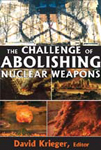 The Challenge of Abolishing Nuclear Weapons, edited by David Krieger, Transaction Publishers, 2009, ISBN: 978-1412810364.
The Challenge of Abolishing Nuclear Weapons, edited by David Krieger, Transaction Publishers, 2009, ISBN: 978-1412810364.
In the more than sixty years since the advent of nuclear weapons, there has been little meaningful progress toward nuclear disarmament. ... In this remarkable collection, scholars and policy analysts argue that humankind has a choice: either allow nuclear weapons to continue to proliferate throughout the world or move toward their complete elimination. ... [I]n a world with nuclear weapons, the fate of humanity rests in the hands of a small number of individuals, whose perceptions, communications, and judgment determine whether there is to be a future. The contributors to this volume provide historical perspective on nuclear weapons policy; explore the role of international law in furthering the prospects of nuclear weapons abolition; consider the obstacles to abolition; present a path to achieving a nuclear weapons-free world; and look beyond abolition to consider issues of post-abolition sovereignty and general and complete disarmament. The goal of a nuclear weapons-free world can be awakened by an engaged citizenry bringing pressure from below in demanding action from political leaders. This book contributes to this awakening and engagement.
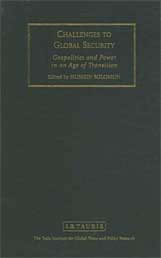 Challenges to Global Security: Geopolitics and Power in an Age of Transition, edited by Hussein Solomon. I.B. Tauris, 2008. ISBN 9781 84511 5272.
Challenges to Global Security: Geopolitics and Power in an Age of Transition, edited by Hussein Solomon. I.B. Tauris, 2008. ISBN 9781 84511 5272.
Ours is an age of great upheaval where change sometimes appears to be the only constant. Three of the most important forces driving such change are globalization, regionalization and democratization. This substantial work makes a concerted attempt to understand these forces, and to show how they impact on the vitally important question of global security. Each discourse receives substantial coverage: from economics and politics to religion, religious fundamentalism and human rights. "Challenges to Global Security" offers one of the richest comparative volumes yet to be published on the subject.
 Nuclear Disarmament: Obstacles to Banishing the Bomb, edited by Jozef Goldblat. London & New York: I.B. Tauris, 2000. ISBN 1-86064-576-3 (hb).
Nuclear Disarmament: Obstacles to Banishing the Bomb, edited by Jozef Goldblat. London & New York: I.B. Tauris, 2000. ISBN 1-86064-576-3 (hb).
The United States and Russia have openly espoused the thesis that nuclear war cannot be won and should not be fought. This volume includes contributions from a group of distinguished international security scholars aiming at banishing the bomb through practical and effective steps.
 Asian Peace: Security and Governance in the Asia-Pacific Region, edited by Majid Tehranian. London & New York: I.B. Tauris, 1999. ISBN 1-86064-469-4 (hb).
Asian Peace: Security and Governance in the Asia-Pacific Region, edited by Majid Tehranian. London & New York: I.B. Tauris, 1999. ISBN 1-86064-469-4 (hb).
Emerging from an international collaborative research project on Human Security and Global Governance, this volume is the first in a series that focuses on how the international community is managing or mismanaging the world human security problems."
Nonviolence and Peacebuilding
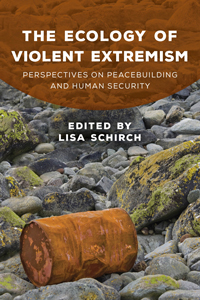 The Ecology of Violent Extremism: Perspectives on Peace Building and Human Security, Edited by Lisa Schirch, Rowman and Littlefield 2018, ISBN: 9781786608468 (hardcover), 9781786608451(softcover), 9781786608475(eBook).
The Ecology of Violent Extremism: Perspectives on Peace Building and Human Security, Edited by Lisa Schirch, Rowman and Littlefield 2018, ISBN: 9781786608468 (hardcover), 9781786608451(softcover), 9781786608475(eBook).
How do we respond to the problem of violent extremism in ways that do not fertilize the root causes that fueled it in the first place? More than 30 of the world’s experts on these questions contribute concise and compelling answers to that question in this book. While many books offer one or two hypotheses for preventing terrorism, this book gives readers the tools to look at the problem from many different angles. The book offers a “map of violent extremism” drawing connections between twenty-five factors that correlate with violent extremism (VE). On a spectrum, counterterrorism seeks to disrupt, detain, and destroy terrorist plans and networks. Prevention and countering of violent extremism (P/CVE) seeks to prevent and counter the belief systems that support violent extremism. Peacebuilding addresses the longer-term factors and root causes driving VE. An ecological approach to VE recognizes that interventions also interact with each other. For example, some approaches to counterterrorism also motivate further recruitment to VE groups and undermine peacebuilding interventions. This book leads readers to recognise the debates within the very definition of violent extremism, and gain insight into a broader paradigm for how we understand and respond to violent extremist beliefs and acts of terror.
 Peace Journalism in Times of War: Peace and Policy, Volume 13, edited by Susan Ross & Majid Tehranian, Transaction Publishers, 2009. ISBN 978-1-4128-1004-3.
Peace Journalism in Times of War: Peace and Policy, Volume 13, edited by Susan Ross & Majid Tehranian, Transaction Publishers, 2009. ISBN 978-1-4128-1004-3.
Amid the ongoing and volatile debate over the nature and potential of peace journalism, this volume presents visionary insights from some of the most prominent scholars in the field. The significant empirical studies included here will provide foundation data for communication studies. The contributors broaden the purview and terrain of peace journalism to include new media, and offers essays on the eff ects and the content of global communications. In sum, the thirteenth volume of Peace and Policy deepens our empirical knowledge of the nature and effects of conflict, while underscoring the increase in numbers of participants and breadth of communications.
 Peace Journalism: The State of the Art (pdf), by Dov Shinar and Wilhelm Kempf, Berlin: Regener, 2007. ISBN: 978-3-936014-12-9.
Peace Journalism: The State of the Art (pdf), by Dov Shinar and Wilhelm Kempf, Berlin: Regener, 2007. ISBN: 978-3-936014-12-9.
The present book deals with the concept of peace journalism from various perspectives. The first part gives an overview of the theoretical approaches that underlie peace journalism. In the second part, concrete examples of existing news discourses are analyzed and peace journalistic vs. war journalistic representations are compared. The third part deals with the practical implementation of peace journalism and presents modules for peace journalistic training. In the fourth part, Dov Shinar summarizes these contributions and draws concrete conclusions.
 Crossing the Red Line: The Struggle for Human Rights in Iran, by Mehrangiz Kar. Mazda Publishing, 2007. ISBN 1568591926.
Crossing the Red Line: The Struggle for Human Rights in Iran, by Mehrangiz Kar. Mazda Publishing, 2007. ISBN 1568591926.
This book chronicles the life of a woman in Iran - a leading feminist activist and human rights lawyer - under the monarchical and Islamic regimes. Kar ties together micro and macro histories to provide a feminist, intellectual, and political portrait of Iran during the 1960's and after.
Human Security and Global Governance
 Global Visioning: hopes and Challenges for a Common Future Peace and Policy, Volume 19, Edited by: Olivier Urbain and Ahmed Abaddi, Transaction Publishers 2015. ISBN: 978-1-4128-5573-0.
Global Visioning: hopes and Challenges for a Common Future Peace and Policy, Volume 19, Edited by: Olivier Urbain and Ahmed Abaddi, Transaction Publishers 2015. ISBN: 978-1-4128-5573-0.
"This volume makes the case for global visioning: the collective process of looking at a larger picture and building common ground for the future. The contributors agree that only by such a process will people be able to address mounting problems like global warming, war, terrorism, and poverty, which threaten the Earth's population. This latest volume in the Peace & Policy series addresses three main themes. "On Spirituality and Ethics" advocates an international culture of nonviolence. "International and Transnational Relations" makes a case for global fellowship. "On Education and Culture" argues that educating children is the first step in reforming the world. The contributors seek solutions to the question of how people can start seeing issues from a global point of view, rather than from narrow national perspectives. In keeping with the global nature and scope of the world's problems, the contributions come from very diverse countries, including Japan, Morocco, South Africa, Germany, Italy, Belgium, and the United States. This work will inspire participation in this much-needed exercise of collective global problem solving."
 Climate Change and Environmental Ethics, edited by Ved P. Nanda, 2011. ISBN: 978-1-4128-1459-1.
Climate Change and Environmental Ethics, edited by Ved P. Nanda, 2011. ISBN: 978-1-4128-1459-1.
There is a broad consensus that climate change presents the international community with a formidable challenge. Yet progress on all fronts-prevention, mitigation, and adaptation, has been slow. If humanity really faces dire consequences, why has there been such reluctance and resistance to do anything about it? Nanda finds an explanation is the sharp divide between the developed and developing countries on how to act. Developing countries demand that major industrialized nations provide the necessary resources and technology to address climate change, while many developed countries seek firm commitments and timetables on action from the developing countries. The result is a stalemate. Climate Change and Environmental Ethics explores this with first-rate research and thinking of scholars from multiple disciplines-ethics, ecology, philosophy, economics, political science, history, and international law. This volume explores alternative ways of conceiving of our relation to the natural world. A spirit of international cooperation and collaboration is needed to meet the challenge, and this book makes a substantial contribution toward that goal. It will compel the reader to think anew about our understanding of the scientific and technical issues, as well as our values and ethical responsibilities regarding climate change.
 Ethical Transformations For A Sustainable Future, edited by Olivier Urbain and Deva Temple, 2010. ISBN: 978-1-4128-1445-4.
Ethical Transformations For A Sustainable Future, edited by Olivier Urbain and Deva Temple, 2010. ISBN: 978-1-4128-1445-4.
It has become increasingly apparent that humanity’s complex social, political, and economic systems are incompatible with the finite capacity of the Earth to replenish resources and absorb wastes. If the planet is to continue to be habitable for the myriad web of other creatures that make life possible, humans must transform their systems so that they are aligned with natural systems. One thing is sure—it will not be Nature’s laws, the delicate interdependence that characterizes Earth’s ecosystems, that change. The change must begin within each person, and from there permeate throughout our social, political, and economic structures.
 Global Obligations for the Right to Food, edited by George Kent. Rowman & Littlefield, 2008. ISBN 978-0-7425-6062-8.
Global Obligations for the Right to Food, edited by George Kent. Rowman & Littlefield, 2008. ISBN 978-0-7425-6062-8.
While governments have primary responsibility for assuring the right to food for people under national jurisdictions, we as a global community all have some responsibilities as well. Global Obligations for the Right to Food explores the various actions that should be taken by governments, non-governmental organizations, and individuals to ensure that all people of the world have access to adequate food.
 The Center Holds: UN Reform for 21st Century Challenges, edited by Kevin Clements & Nadia Mizner, 2008. ISBN: 978-1-4128-0778-4.
The Center Holds: UN Reform for 21st Century Challenges, edited by Kevin Clements & Nadia Mizner, 2008. ISBN: 978-1-4128-0778-4.
The United Nations remains a unique institutional hope for addressing and resolving the world's major environmental, developmental, and humanitarian problems. It representsglobal aspirations for a just and peaceful world by inspiring the political imagination of individuals and collectivities. But, because it is now viewed primarily as a "trade union" for expressing the national political interests of 192 state parties, as Clements and Mizner's volume of essaysdemonstrate the UN has succumbed to political cynicism and skepticism.
 Fear of Persecution: Global Human Rights, International Law, and Human Well-Being, By James White & Anthony Marsella. Rowman & Littlefield Publishers, Inc., 2007.
Fear of Persecution: Global Human Rights, International Law, and Human Well-Being, By James White & Anthony Marsella. Rowman & Littlefield Publishers, Inc., 2007.
Every year there are tens of millions of displaced people and refugees who are in flight due to the fear of persecution based on race, religion, nationality, or political opinion. This book offers an absorbing and necessary overview of their plight.
 Learning to Seek: Peace & Policy, edited by, Jim Dator, Walter Anderson, & Majid Tehranian, Transaction Publishers, 2006. ISBN 978-1-4128-0615-2.
Learning to Seek: Peace & Policy, edited by, Jim Dator, Walter Anderson, & Majid Tehranian, Transaction Publishers, 2006. ISBN 978-1-4128-0615-2.
The accelerating technological transformation in learn- ing has necessitated an ability to search and differentiate among the one billion web pages, libraries, databases, books, newspapers, magazines, radio and television stations, and opinion columns available online. This volume focuses on the normative challenges that the current technological transformation presents to all professionals engaged in higher education.
 America the World: The Double Bind, edited by Kevin Clements & Majid Tehranian, Transaction Publishers, 2005. ISBN 978-1-4128-0460-8.
America the World: The Double Bind, edited by Kevin Clements & Majid Tehranian, Transaction Publishers, 2005. ISBN 978-1-4128-0460-8.
As the world's first democracy with a written constitution and Bill of Rights, the United States has stood for global aspirations toward democratic liberty, equality, and solidarity since its formation in 1776. However, as it developed into an empire by the late nineteenth century, the United States also has threatened the liberties of other peoples, including Native Americans, Hawaiians, Latin Americans, Asians, and Africans. The American role in world affairs has long been polarized around two conflicting images and strategies.
 Eurasia: A New Peace Agenda, edited by Michael Intriligator, Alexander Nikitin & Majid Tehranian. New York: Elsevier, 2005. ISBN 0-444-51865-7.
Eurasia: A New Peace Agenda, edited by Michael Intriligator, Alexander Nikitin & Majid Tehranian. New York: Elsevier, 2005. ISBN 0-444-51865-7.
The volume is focused on a new peace agenda grounded in a dialogue among the Eurasia civilizations. Part I deals with the problems and prospects of such a dialogue and its consequences for world peace. Part II focuses on the old dilemmas and new challenges in Eurasian security. The nuclear arms race, religious resurgence, super-terrorism, militarism, imperialism, and confidence building are among the topics. Part III concentrates on globalization and regionalization as the two dominant Eurasian trends.
 Democratizing Global Media: One World, Many Struggles, edited by Robert Hackett & Yuezhi Zhao.Lanham, MD: Rowman & Littlefield Publishers, Inc., 2005. ISBN 0-742-53642-4 (hb).
Democratizing Global Media: One World, Many Struggles, edited by Robert Hackett & Yuezhi Zhao.Lanham, MD: Rowman & Littlefield Publishers, Inc., 2005. ISBN 0-742-53642-4 (hb).
An international, interdisciplinary group of journalists and scholars discusses key-and often contentious-issues such as the power of media, the benefits of media globalization, and the political role of media.
 Passion for Peace, by Stuart Rees. Sydney Australia: New South Wales University Press; Baltimore, MD: Johns Hopkins University Press, 2003. ISBN 0-86840-750-X (pb).
Passion for Peace, by Stuart Rees. Sydney Australia: New South Wales University Press; Baltimore, MD: Johns Hopkins University Press, 2003. ISBN 0-86840-750-X (pb).
In a dark and pessimistic time, A Passion for Peace is timely and uplifting work. Written in an engaging, optimistic style, the book is both practical and philosophical, and shows how a creative use of power can contribute to peace with justice in any context or country.
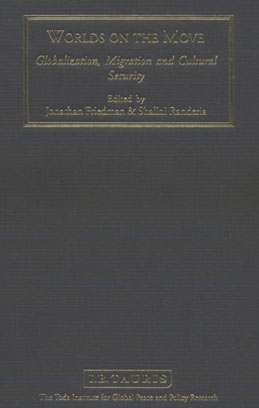 Worlds on the Move: Globalization, Migration, and Cultural Security, edited by Jonathan Friedman and Shalini Randeria, 2003. ISBN 0-86064-951-3 (hb).
Worlds on the Move: Globalization, Migration, and Cultural Security, edited by Jonathan Friedman and Shalini Randeria, 2003. ISBN 0-86064-951-3 (hb).
The contribution of this collection lies in its assembly of distinguished international scholars from several different continents and disciplines, including anthropology, political science, cultural studies, sociology, and history, to illuminate the issue of contemporary migration.
 Democratizing Global Governance, edited by Joseph Camilleri and Esref Aksu. New York: Palgrave Press, 2002. ISBN 0-333-97122-1 (pb).
Democratizing Global Governance, edited by Joseph Camilleri and Esref Aksu. New York: Palgrave Press, 2002. ISBN 0-333-97122-1 (pb).
In this thought-provoking text, the myths and mantras of this apparently irresistible force are challenged and dissembled. By examining a number of fundamental questions, the contributors put forward a radical reform agenda for global governance.
 Managing the Global: Globalization, Employment, and Quality of Life, edited by Don Lamberton. London & New York: I.B. Tauris, 2001. ISBN 1-86064-706-5 (hb).
Managing the Global: Globalization, Employment, and Quality of Life, edited by Don Lamberton. London & New York: I.B. Tauris, 2001. ISBN 1-86064-706-5 (hb).
The fifth volume in a continuing series on Human Security and Global Governance set up by the TODA Institute, this book, edited by Donald Lamberton, focuses on that most misinterpreted of notions: "globalization". We live in a "global village" (McLuhan), a "post-industrial" (Bell) and an "information society" (Porat). Others have suggested that this is the age of the "end of history" (Fukuyama). But other experts suggest that we live in an era called the "beginning of history", when for the first time, over two-thirds of humanity can claim the right to be history's subject and not its object. As Lamberton and the contributors show, even the global village of Coca-Cola, Hiltons and McDonalds hides a different reality: globalization and tribalization, they demonstrate, are two sides of the same coin.
 Reimagining the Future: Towards Democratic Governance, by Joseph A. Camilleri, Kamal Malhotra, Majid Tehranian, et al. Bundoora, Australia: Dept of Politics, La Trobe University, 2000. ISBN 0-646-39994-2 (pb).
Reimagining the Future: Towards Democratic Governance, by Joseph A. Camilleri, Kamal Malhotra, Majid Tehranian, et al. Bundoora, Australia: Dept of Politics, La Trobe University, 2000. ISBN 0-646-39994-2 (pb).
This book outlines possible futures in which democratic values are honored in a global world. It advocates for a future that embraces economic, social and environmental peace and justice.
 Worlds Apart: Human Security and Global Governance, edited by Majid Tehranian. London & New York: I.B. Tauris, 1999. ISBN 1-86064-444-9 (hb).
Worlds Apart: Human Security and Global Governance, edited by Majid Tehranian. London & New York: I.B. Tauris, 1999. ISBN 1-86064-444-9 (hb).
Emerging from an international collaborative research project on Human Security and Global Governance, this volume is the first in a series that focuses on how the international community is managing or mismanaging the world human security problems.
 Not by Bread Alone: Food Security and Governance in Africa, edited by Adelani F. Ogunrinade, Ruth Oniang'o & Julian May. Johannesburg: University of Witwatersrand Press, 1999. ISBN 0-620-25061-5 (pb).
Not by Bread Alone: Food Security and Governance in Africa, edited by Adelani F. Ogunrinade, Ruth Oniang'o & Julian May. Johannesburg: University of Witwatersrand Press, 1999. ISBN 0-620-25061-5 (pb).
Not by Bread Alone is the proceedings of a conference on Human Security and Governance in Africa hosted by the Toda Institute for Global Peace and Policy Research and held in Durban, South Africa from 19 to 21 June, 1998.
 Peace through Tourism: Promoting Human Security Through International Citizenship, Edited by Lynda-ann Blanchard and Freya Higgins-Desbiolles, Taylor & Francis, 2013. ISBN: 978-0-41582-463-7.
Peace through Tourism: Promoting Human Security Through International Citizenship, Edited by Lynda-ann Blanchard and Freya Higgins-Desbiolles, Taylor & Francis, 2013. ISBN: 978-0-41582-463-7.
"Peace through tourism refers to a body of analysis which suggests tourism may contribute to cross-cultural understanding, tolerance and even peace between communities and nations. What has been largely missing to date is a sustained critique of the potential and capacities of tourism to foster global peace...Written by leading academics, this groundbreaking book will provide students, researchers and academics a sustained critique of the potential and capacities of tourism to foster global peace."
(http://www.barnesandnoble.com/w/peace-through-tourism-lynda-ann-blanchard/1113892644?ean=9780415824637)
Read a review of the book here: http://ecoclub.com/headlines/reviews/898-130924-peace-through-tourism
 Anti-Racism and Multiculturalism: Studies in International Communication, edited by Mark D. Alleyne, Transaction, 2010. ISBN 978-1-4128-1321-1.
Anti-Racism and Multiculturalism: Studies in International Communication, edited by Mark D. Alleyne, Transaction, 2010. ISBN 978-1-4128-1321-1.
Although there has been little work on the impact of racial difference on the contours of contemporary international order, there has been a sizeable body of research intended to abolish the credibility of pseudo-scientific racism. Such racism has provided the ideological foundation and justification for imperialism, colonialism, the holocaust, and apartheid. Race has been debunked as a myth. Because of this, racism the ideology bred of human classification according to racial difference has been found to be intellectually and morally barren. But the need to communicate egalitarian and scientific sentiments remains.
The contributors to this volume consider five questions: How does the literature on antiracism improve our understanding of conflict resolution? How does the analysis of the media's role in racist and anti-racist discourses improve the process of theorizing on hate and war propaganda? How can research on anti-racist discourse improve UN peacekeeping? What implications does this subject have for theory-building and cultural diversity? How and why should the literature on anti-racism expand research in international relations? This is a unique, worthwhile framework for cross-disciplinary research in race and intellectual consensus and conflict.
Mediation, Conflict Resolution and Reconciliation
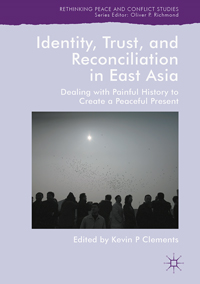 Identity, Trust, and Reconciliation in East Asia: Dealing with Painful History to Create a Peaceful Present, Edited by Kevin P. Clements, Palgrave Macmillan 2018. ISBN: 978-3-319-54896-8 (hardcover), 978-3-319-85513-4 (softcover), 978-3-319-54897-5 (eBook).
Identity, Trust, and Reconciliation in East Asia: Dealing with Painful History to Create a Peaceful Present, Edited by Kevin P. Clements, Palgrave Macmillan 2018. ISBN: 978-3-319-54896-8 (hardcover), 978-3-319-85513-4 (softcover), 978-3-319-54897-5 (eBook).
This edited collection explores how East Asia’s painful history continues to haunt the relationships between its countries and peoples. Through a largely social-psychological and constructivist lens, the authors examine the ways in which historical memory and unmet identity needs generate mutual suspicion, xenophobic nationalism and tensions in the bilateral and trilateral relationships within the region. This text not only addresses some of the domestic drivers of Japanese, Chinese and South Korean foreign policy - and the implications of increasingly autocratic rule in all three countries – but also analyses the way in which new security mechanisms and processes advancing trust, confidence and reconciliation can replace those generating mistrust, antagonism and insecurity. Expert contributions to this volume are drawn from South Korea, China, Japan and European scholars. The volume is an excellent starting point for understanding the difficulties preventing closer, spontaneous collaboration in the region and lasting reconciliation following Second World War trauma and pain.
 Risk and Uncertainty, Understanding and Dialogue in the 21st Century, Volume 16, edited by Kevin P. Clements and Olivier Urbain, 2012. ISBN 978-1-4128-4772-8
Risk and Uncertainty, Understanding and Dialogue in the 21st Century, Volume 16, edited by Kevin P. Clements and Olivier Urbain, 2012. ISBN 978-1-4128-4772-8
The lessons drawn in this volume underline the importance of communication, honesty, and a concerned government responsive to the needs of citizens in crisis.Each of the contributions is grappling with different ways in which words, theories, ideologies, and perspectives can hurt or heal, divide or unite, reconcile or destroy.
 Facts, Rights and Remedies: Implementing International Law in the Israel/Palestine Conflict, by George E. Bisharat, Hastings International Comparative Law Review, University of California, 28:3, Spring 2005. ISSN 0149-9246.
Facts, Rights and Remedies: Implementing International Law in the Israel/Palestine Conflict, by George E. Bisharat, Hastings International Comparative Law Review, University of California, 28:3, Spring 2005. ISSN 0149-9246.
This volume addresses international law as it pertains to the Israel/Palestine conflict.
 Beyond Reconstruction in Afghanistan: Lessons from Development Experience, edited by John D. Montgomery & Dennis A. Rondinelli. New York: Palgrave MacMillan, 2004. ISBN 1-4039-6511-0 (hb).
Beyond Reconstruction in Afghanistan: Lessons from Development Experience, edited by John D. Montgomery & Dennis A. Rondinelli. New York: Palgrave MacMillan, 2004. ISBN 1-4039-6511-0 (hb).
The interaction of failed states, terrorism and the need for "nation building" is at the top of the international agenda, with particular focus on Afghanistan and Iraq. This path breaking collection brings together top analysts to examine the goals and challenges facing efforts to reconstruct states that have collapsed into anarchy or have been defeated in war, drawing lessons from 50 years of past experience with post-conflict reconstruction and development around the world to assess development plans in a country devastated by more than a century of conflict.
 Bridging a Gulf: Peacebuilding in West Asia, edited by Majid Tehranian. London & New York: I.B. Tauris, 2003. ISBN 1-86064-884-3 (hb).
Bridging a Gulf: Peacebuilding in West Asia, edited by Majid Tehranian. London & New York: I.B. Tauris, 2003. ISBN 1-86064-884-3 (hb).
Emerging from a series of meetings of the International Commission for Security and Cooperation in West Asia, this volume consists of contributions from noted scholars and diplomats searching for peaceful settlement of regional disputes and the establishment of a durable security regime. The volume is edited by peace scholars from Iran, Iraq, and Kuwait-- the three countries that were at war in 1980-88 and 1990-91.
Religion and Peacebuilding
 Protecting the Sacred, Creating Peace in Asia-Pacific, Volume 17, edited by Chaiwat Satha-Anand and Olivier Urbain, 2013. ISBN: 978-1-4128-4985-2
Protecting the Sacred, Creating Peace in Asia-Pacific, Volume 17, edited by Chaiwat Satha-Anand and Olivier Urbain, 2013. ISBN: 978-1-4128-4985-2
Using case studies from the Middle East, South Asia, Southeast Asia, and the Pacific Basin, this book examines the global trend of violence against religious places and figures. The contributors believe attacks on sacred places to be particularly damaging to peace and harmony because of the centrality of religion in many Asian and Pacific countries.
 Islam and Politics in Southeast Asia, edited by Johan Saravanamuttu, Routledge, 2010. ISBN 978-0-415-56392-5.
Islam and Politics in Southeast Asia, edited by Johan Saravanamuttu, Routledge, 2010. ISBN 978-0-415-56392-5.
Southeast Asia manifests some of the most interesting, non-violent as well as conflictual elements of Islamic social and political life in the world. This book examines the ways in which Muslim politics in Southeast Asia has greatly impacted democratic practice and contributed to its practical and discursive development. It addresses the majority and minority situations of Muslims within both democratic and authoritarian politics. It shows, for example, how in Muslim majority Indonesia and Malaysia, political Islam directly engages with procedural democracy; in Muslim minority Thailand and the Philippines, it has taken a violent route; and in Muslim minority Singapore, it has been successfully managed through civil and electoral politics. By exploring such nuances, variations, comparisons and linkages among Muslim majority and minority countries, this book deepens our understanding of the phenomenon of Muslim politics in the region as a whole.
 Conflict, Religion, and Culture: Domestic and International Implications for Southeast Asia and Australia, edited by Luca Anceschi, Joseph A. Camilleri, and Benjamin T. Tolosa Jr., Atieno de Manila University, 2009. ISBN 978-971-0426-05-8.
Conflict, Religion, and Culture: Domestic and International Implications for Southeast Asia and Australia, edited by Luca Anceschi, Joseph A. Camilleri, and Benjamin T. Tolosa Jr., Atieno de Manila University, 2009. ISBN 978-971-0426-05-8.
Mindful of the interconnections between the global and the local, and contemporary developments in four multiethnic, multifaith societies, which are also significant middle powers in Asia Pacific: Indonesia, Malaysia, the Philippines, and Australia. Some of the questions tackled in this book are the following: To what extent have state responses to the War on Terror been shaped by domestic politics? How do Muslim political leaders position themselves vis-à-vis the United States and their own domestic constituencies? What has been the role of Islam in relation to internal ethnic tensions where it is the majority religion and where it is the minority religion? To what extent is the conflict in the southern Philippines a reflection of historic grievances, localized feuds, and global fault lines?
 Globalization and Identity: Cultural Diversity, Religion, and Citizenship, edited by Majid Tehranian and B. Jeannie Lum. New Brunswick, NJ: Transaction Publishers, 2005. ISBN 1-4128-0561-9.
Globalization and Identity: Cultural Diversity, Religion, and Citizenship, edited by Majid Tehranian and B. Jeannie Lum. New Brunswick, NJ: Transaction Publishers, 2005. ISBN 1-4128-0561-9.
This volume of Peace & Policy addresses the overarching question, "What are the effects of globalization in the areas of culture, ethnic diversity, religion, and citizenship, and how does terrorism help groups attain a sense of global identity?"
 Political Islam in South East Asia, edited by Johan Saravanamuttu, in Global Change, Peace and Security, 16:2, June 2004. Carfax Publishing, 2004. ISBN 1478-1158.
Political Islam in South East Asia, edited by Johan Saravanamuttu, in Global Change, Peace and Security, 16:2, June 2004. Carfax Publishing, 2004. ISBN 1478-1158.
This volume of Global Change, Peace & Security looks at various manifestations of Political and civil Islam in modern South East Asia.
 Dialogue of Civilizations: A New Peace Agenda for a New Millenium, edited by Majid Tehranian & David W. Chappell. London & New York: I.B. Tauris, 2002. ISBN 1-86064-712-X (hb). Japanese edition, Tokyo: Ushio Publishers, 2004.
Dialogue of Civilizations: A New Peace Agenda for a New Millenium, edited by Majid Tehranian & David W. Chappell. London & New York: I.B. Tauris, 2002. ISBN 1-86064-712-X (hb). Japanese edition, Tokyo: Ushio Publishers, 2004.
Responding to the United Nations declaration of the year 2001 as The Year of Dialogue Among Civilizations, in this volume, a group of distinguished peace scholars from seven civilizations are engaged in a normative and policy dialogue. Hindu, Buddhist, Confucian, Christian, Islamic, Indigenous, and secular Humanist voices apply their peace agendas to offer concrete policy proposals to meet the challenges of the 21st century.
Music, Arts, and Peace
 Music, Power and Liberty: Sound, Song and Melody as Instruments of Change, Edited by: Oliver Urbain, Craig Robertson, I.B.Tauris & Co Ltd, 2015. ISBN: 9781784534448.
Music, Power and Liberty: Sound, Song and Melody as Instruments of Change, Edited by: Oliver Urbain, Craig Robertson, I.B.Tauris & Co Ltd, 2015. ISBN: 9781784534448.
"Music is a complex and multi-faceted art form. Yet too often it is regarded as discrete and self-contained. The chapters in this groundbreaking book explore different aspects of how music may shape society and culture, yet go much further in viewing musical activity as a mode of power that can transform the lives of communities and individuals. The contributors (who include sociologists, musicologists and performers) focus above all on the relationship between music and the political upheavals of the Arab Spring. They examine key topics like music and revolution in Tunisia; the Egyptian musical tradition of the Revolutionary Song; and the ambivalent social status of the Arab musician, revered by the public when performing but also facing suspicion in a society where music is rightly seen as dangerous and subversive. In showing how music has been used to challenge the status quo, as well as enforce it, the ambiguity of music is fully revealed: it can be used to bolster both regime power and popular liberty, often simultaneously. This is a vital contribution to more nuanced understandings of music and politics."
 Music and Conflict Transformation: Harmonies and Dissonances in Geopolitics, Edited by: Olivier Urbain, I.B.Tauris & Co Ltd, 2007 (reprint 2015). ISBN: 9781845115289.
Music and Conflict Transformation: Harmonies and Dissonances in Geopolitics, Edited by: Olivier Urbain, I.B.Tauris & Co Ltd, 2007 (reprint 2015). ISBN: 9781845115289.
"How far can the relationship between music and politics be used to promote a more peaceful world? That is the central question which motivates this challenging new work. Combining theory from renowned academics such as Johan Galtung, Cindy Cohen and Karen Abi-Ezzi with compelling stories from musicians like Yair Dalal, the book also includes an exclusive interview with folk legend Pete Seeger. In each instance, practical and theoretical perspectives have been combined in order to explore music's role in conflict transformation.The book is divided into five sections. The first, 'Frameworks', reflects indepth on the connections between music and peace, while the second, 'Music and Politics', discusses the actual impact of music on society. The third section, 'Healing and Education' offers specific examples of the transformative power of music in prisons and other settings of conflict-resolution, while the fourth, 'Stories from the Field', tells true stories about music's impact in the Middle East and elsewhere.
Finally, 'Reflections' encourages the reader to consider a personal evaluation of the work with a view to further explorations of the capacity of music to promote peace-building. This reprint addition includes a forward by Wayne Shorter.:
 Music and Solidarity Questions of Universality, Consciousness, and Connection, Peace & Policy, Volume 15, edited by Felicity Laurence and Olivier Urbain, 2011. ISBN: 978-1-4128-4230-3
Music and Solidarity Questions of Universality, Consciousness, and Connection, Peace & Policy, Volume 15, edited by Felicity Laurence and Olivier Urbain, 2011. ISBN: 978-1-4128-4230-3
The philosopher Christopher Small suggests that musical meanings are concerned with relationships, both with other human beings and with the world, and that music functions as a means of exploration, affirmation, and celebration of those relationships...This text moves far beyond the knowledge of music’s power upon humans, however this may be conceived and explained. It addresses a field of inquiry that is still a tiny endeavor, at least in comparison with all other academic efforts in the world. The sparseness of serious theoretical engagement with the topic of music’s potential role in the area of peace and policy is echoed by how little music is directly used in the "real world” for building a more humane consciousness. Finding ways to that goal is the purpose of this work.
 Music and Conflict Transformation: Harmonies and Dissonances in Geopolitics, edited by Olivier Urbain. I.B. Tauris, 2008. ISBN 7981 84511 5289.
Music and Conflict Transformation: Harmonies and Dissonances in Geopolitics, edited by Olivier Urbain. I.B. Tauris, 2008. ISBN 7981 84511 5289.
How far can the relationship between music and politics be used to promote a more peaceful world? That is the central question which motivates this challenging new work. Combining theory from renowned academics with compelling stories from engaged musicians, the book also includes an exclusive interview with folk legend Pete Seeger. In each instance, practical and theoretical perspectives have been combined in order to explore music's role in conflict transformation.